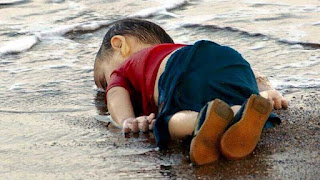The Syrian war began in 2011. Bashar Assad and his government started mass killing protestors. By 2015, nearly 250,000 died in the Syrian war, most of them civilians. There was little international interest. Those who analysed Google searches for Syria or refugees found zero searches for four years. That changed overnight when the picture of the drowned Syrian toddler (above) Alan Kurdi went viral internationally. Suddenly, the Google search for Syria and refugees zoomed. Donations to the Red Cross were greatly boosted by that single picture. Why did a single photograph manage to motivate when the death of a quarter of a million people didn’t?
*****
Joseph Stalin was a disgusting genocidal butcher. But
he has some memorable quotes attributed to him. “One death is a tragedy; a
million deaths is a statistic”, he had said.
This feeling of indifference was named “Psychic
Numbing” by Dr Robert Lifton, a psychiatrist who studied this phenomenon among
Hiroshima survivors.
Dr Paul Slovic, the psychology professor at the
University of Oregon has devoted his career to research on this subject. He
finds that our brains process situations through gut feelings, not logic. We
don’t necessarily feel twice as bad
when two people die, as compared to one. And as the numbers grow, numbness
grows as well. We don’t notice the difference between 80 lit candles and 81.
Similarly, our feelings don’t register the difference between 80 deaths and 81
deaths.
Every year, more than two million children die from diarrhea
and eight hundred thousand from measles. Stalin starved seven million
Ukrainians in a single year, and Pol Pot killed two million Cambodians. Did the
world blink? The official coronavirus death count has passed 3 million. Will we
feel any different when it crosses 5 million or 10 million? We likely won’t.
*****
Our capacity to feel is limited.
Many of us are willing to help a single suffering
child. Studies have shown that a picture of two children brings down the desire
to help. And if it is known that the child is one among thousands or millions,
the charitable motive disappears. One life is valuable, but that life loses
value, perceptually, if it is part of a larger tragedy. This is technically
called the “compassion fade” and the “compassion collapse”.
Charities such as “Save the Children” have recognized it
is better to endow a donor with a single, named child to support than to ask
for a bigger cause. No matter where we live, we have probably seen a television
story where a child falls deep into a narrow well or an abandoned shaft, and
the live coverage of the rescue operation is watched by millions for two days.
Those millions celebrate the triumph of that rescue because it is an individual
story.
There is nothing new about racism in America. But the
story and a 9-minute video of a white police officer fatally choking a black
man by pressing his knee on him added new life to the “black lives matter”
movement.
Abel Herzberg, a holocaust survivor has a famous
quote: “There were not six million Jews murdered; there was one murder, six
million times.”
*****
If three million people have died in the pandemic,
what is there for us to do? We think our efforts are so puny, we end up doing
nothing. This is called a “false sense of inefficacy”. It’s not correct to
assume we can’t help, we can.
Awareness of the concepts of psychic numbing and compassion
collapse is important. It makes us focus on individuals rather than abstract
masses. Since the start of the pandemic, I have picked up two individuals in my
neighbourhood, a cobbler and a car-washer. Every month, I partly compensate
their monthly loss of earnings. They are happy, and I am happy. The joy of
giving is no less than the joy of receiving.
Millions affected by the pandemic is a numbing concept.
But any of us can help an identified one or two people. When you want to, help
as soon as possible. Compassion also has a shelf life and an expiry date.
Ravi

वाचताना भितीने पोटात गोळा आला पण शेवट वाचल्यावर आशा जागृत होते
ReplyDeleteVery thought provoking. Thanks Ravi
ReplyDeleteThat's a very kind thing to do, Ravi.
ReplyDeleteVery well put Ravi!
ReplyDeleteLobh...